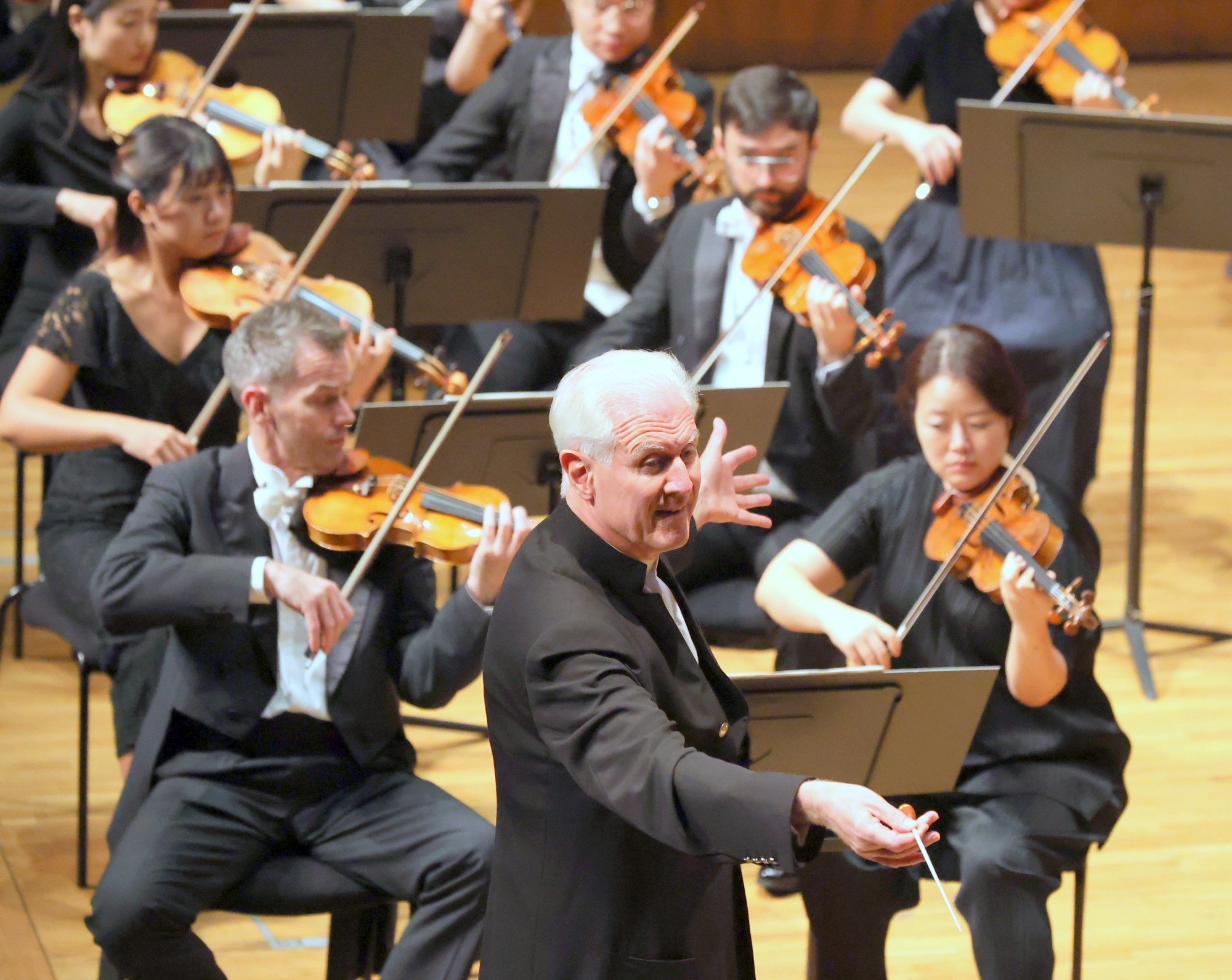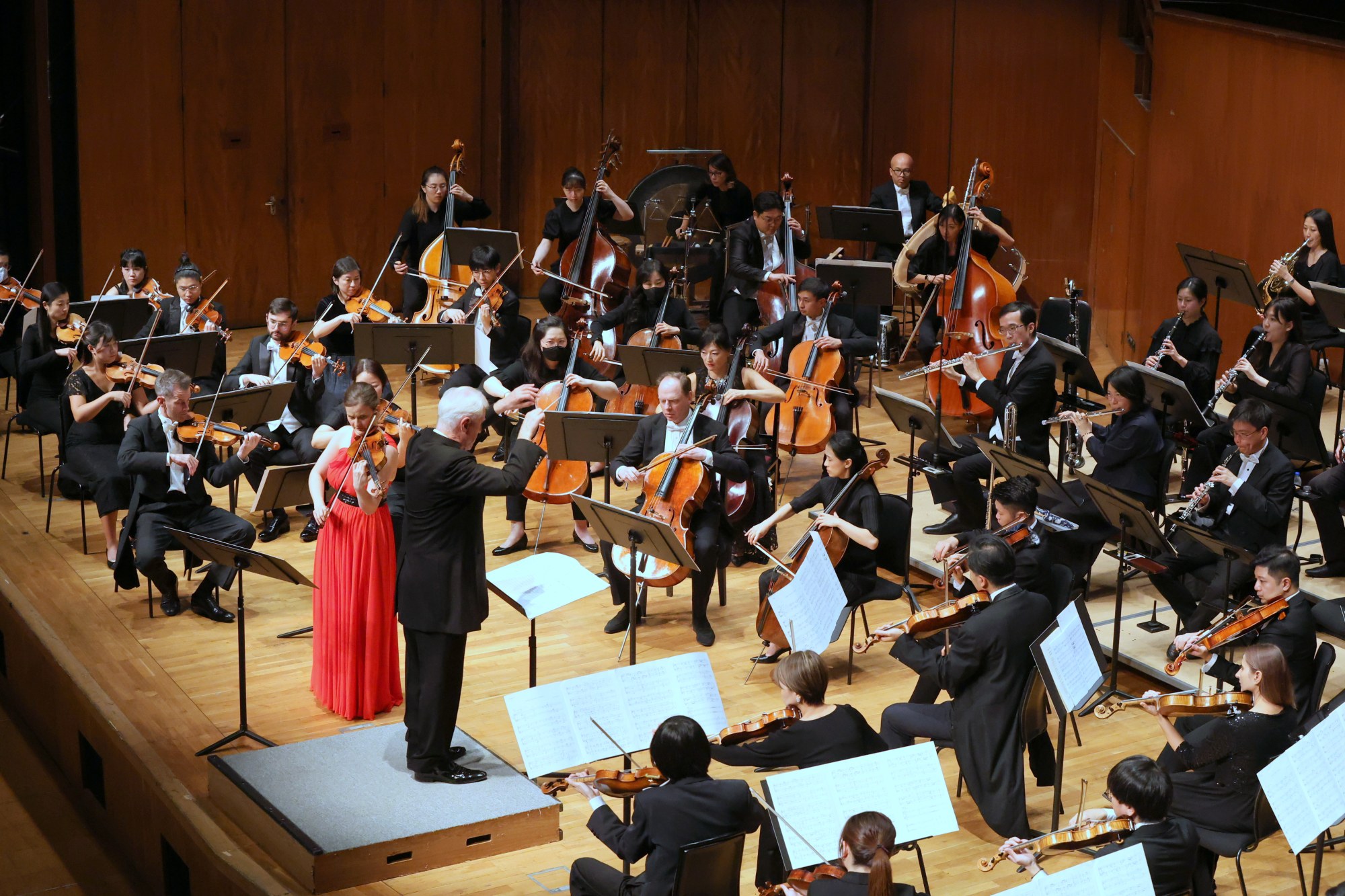There was plenty of music for your buck in the Hong Kong Sinfonietta’s concert at Hong Kong City Hall on October 21 – two violin concertos, including a Hong Kong premiere, and two symphonies to boot.
In the all-Mozart first half, the Sinfonietta produced a refreshingly light and buoyant sound under their music director, Christoph Poppen. They showed stylistic poise in the composer’s Symphony No 33, then paired well with German violinist Veronika Eberle in an effervescent and nuanced rendition of the Violin Concerto No 3.
While much of the first violin articulation in the opening Allegro assai movement of the symphony was tight and crisp, it occasionally overshadowed the second violins sitting opposite. Later in the finale, too, it was less of an issue of volume but more a case of the section needing to project their rhythm with greater presence in order to balance the firsts.
The lovely lyricism from both oboists contributed to a finely woven Andante moderato under Poppen’s direction; more exaggeration of the Menuetto’s echo effects would have made for a more poignant contrast with the delightfully relaxed Trio nestled in between.

Even if the fires were a little dim here and there, the finale was suitably edgy and plenty of fun. The accents in the wind instruments were punctuated brilliantly and the overall rhythmic drive of the ensemble never let up.
The orchestra was then joined by Eberle for Mozart’s much loved Violin Concerto No 3. This proved a veritable celebration in G major that was laden with subtlety and tonal refinement in her solo part.
Performing on the 1700 “Dragonetti” Stradivarius, Eberle’s playing in the opening Allegro was joyous, spurring plenty of convivial musical conversation with the Sinfonietta players.
Aside from her opening chord that didn’t quite “speak”, the violinist’s sound production and articulation were immaculate throughout, and her solo cadenza sparkled with creativity.
Over a warm bed of muted string triplets, Eberle’s silky sounding theme in the Adagio hovered angelically, culminating in a wonderful, dream-like cadenza.
HK Phil’s fabulous Tchaikovsky, Joshua Bell’s fire and finesse
HK Phil’s fabulous Tchaikovsky, Joshua Bell’s fire and finesse
The ensuing Rondeau: Allegro was as youthful and cheeky as one could have hoped for and the soloist’s seductive take on the pavane-like minor interlude was a delight.
As the well-balanced oboes and horns brought the work to its conclusion, there remained little doubt why the concerto is so popular.
Just why Schubert failed to complete his Symphony No. 8 in B minor is contentious at best. Whether it was the distraction of his Wanderer Fantasy for solo piano or his initial outbreak of syphilis while working on a third movement Scherzo, he did live another six years and left it just as it is, strangely complete in its incompleteness.
In this rendition by the Sinfonietta, the stormy aspects and the extremes in dynamic range in both movements were somewhat light on drama.
The agitated and hushed shuffling of the violin semiquavers, the fine intertwining of the woodwind, and the lovely second subject from the cellos, all boded well. But even where Poppen maintained strong tension in the development sections of the Allegro moderato, more bite and emotional despair was needed in the playing.
What it’s like rehearsing for a concert that a typhoon’s about to nix
What it’s like rehearsing for a concert that a typhoon’s about to nix
An awkward and spasmodic spatter of applause irritated and disturbed the (usually) seamless segue into the mysterious beauty found in the Andante, but a full outbreak was saved by the conductor with some swift hand gestures to the audience.
The mysterious second movement was lovingly shaped by Poppen and the playing was attentive and focused. It was in the profound hushed passages (marked triple piano) where the first violins tease us into a world of new harmonies that perhaps less vibrato, and more vulnerability in the sound might have enhanced the mystery of Schubert’s plunge into uncharted harmonic waters.
Mystery of another kind, that of life and birth, rounded off a fulfilling evening of music in Japanese composer Toshio Hosokawa’s fascinating 2020 composition Genesis for Violin and Orchestra, a Sinfonietta co-commission and gift to Eberle and her newborn son.

Returning to the stage, the German soloist immersed herself in this new world of sound with deep conviction.
Stemming from a highly atmospheric wavering motion in strings and harp “suggestive of amniotic fluid”, according to Hosokawa in his programme notes, Eberle’s playing aptly blossomed as life (the violin) emerged. Where more urgency and extended technique came into play, Eberle’s playing was ever assured.
The muted trumpets impressed, as did the lengthier duet between the flute and solo violin later on. After some precise outbursts in the percussion, Chang Pei-chieh’s fine cello solo and Eberle’s fluid harmonies peaked, before the music wound down and signalled the work’s quasi “return to the mother ship” and to the gentle swelling that began.
Without a shadow, Genesis is a worthy addition to the violin concerto repertoire.
Great Violin Concertos: Veronika Eberle Plays Hosokawa & Mozart, Veronika Eberle with the Hong Kong Sinfonietta, Hong Kong City Hall Concert Hall. Reviewed: Oct 21

